Global microscope on the microfinance business environment 2012
Global microscope on the microfinance business environment 2012
Global microscope on the microfinance business environment 2012
Create successful ePaper yourself
Turn your PDF publications into a flip-book with our unique Google optimized e-Paper software.
30<br />
■ Nepal<br />
Key characteristics of <strong>the</strong> microfi nance <strong>business</strong><br />
envir<strong>on</strong>ment:<br />
l Nepal’s microfi nance market is highly<br />
fragmented, with very few players of signifi cant<br />
size. The market fragmentati<strong>on</strong> refl ects Nepal’s<br />
geography. Microfi nance services are ubiquitous in<br />
<strong>the</strong> Terai regi<strong>on</strong> al<strong>on</strong>g <strong>the</strong> border with India and<br />
al<strong>on</strong>g <strong>the</strong> country’s main highways, but thinly<br />
spread or absent in Nepal’s remote regi<strong>on</strong>s.<br />
l Nepal Rastra Bank (NRB, <strong>the</strong> central bank)<br />
regulates commercial banks, development banks,<br />
fi nance companies and microfi nance development<br />
banks. It c<strong>on</strong>siders Nepal overbanked and has<br />
stopped licensing banks with <strong>the</strong> excepti<strong>on</strong> of<br />
microfi nance development banks (MFDBs). NRB<br />
gives priority to those MFDBs willing to offer<br />
services in remote areas. Some 40-odd licence<br />
applicati<strong>on</strong>s are pending with NRB. Two have been<br />
approved since 2011. The IMF has recommended<br />
that a 2011 moratorium <strong>on</strong> banking licences be<br />
extended to MFDBs.<br />
l NRB appears to have sec<strong>on</strong>d thoughts about<br />
allowing newly licensed MFDBs to collect public<br />
deposits. For instance, Nirdhan has been<br />
disallowed to collect public deposits in its new<br />
branches.<br />
l The main formal providers are upscaled NGOs<br />
and regi<strong>on</strong>al rural development banks (RRDBs). As<br />
of June <strong>2012</strong>, <strong>the</strong>re were 23 of <strong>the</strong>se instituti<strong>on</strong>s in<br />
operati<strong>on</strong>. RRDBs were formerly state-run, but four<br />
out of fi ve are now privately owned. The largest<br />
government player is <strong>the</strong> Agricultural Development<br />
Bank (ADB), which provides wholesale funds to<br />
related standal<strong>on</strong>e co-operatives (Small Farmer Cooperatives).<br />
l As of June <strong>2012</strong>, 38 fi nancial intermediary NGOs<br />
(FINGOs) were in operati<strong>on</strong> and are currently<br />
registered with <strong>the</strong> central bank. FINGOS and<br />
MFDBs can take deposits from <strong>the</strong>ir members.<br />
FINGOs also have a limited banking licence, which<br />
allows <strong>the</strong>m to borrow from commercial banks for<br />
client-lending purposes. These borrowings usually<br />
fall under <strong>the</strong> mandatory deprived-sector lending<br />
portfolio of commercial banks.<br />
© The Ec<strong>on</strong>omist Intelligence Unit Limited <strong>2012</strong><br />
<str<strong>on</strong>g>Global</str<strong>on</strong>g> <str<strong>on</strong>g>microscope</str<strong>on</strong>g> <strong>on</strong> <strong>the</strong> microfi nance <strong>business</strong> envir<strong>on</strong>ment <strong>2012</strong><br />
l Public and private instituti<strong>on</strong>s are regulated<br />
identically. Although <strong>the</strong>re are no interest rate<br />
restricti<strong>on</strong>s in Nepal, <strong>the</strong> role of government<br />
instituti<strong>on</strong>s has kept lending rates low, at 18-24%.<br />
l A microfi nance credit bureau is expected to be<br />
established in <strong>2012</strong>-13. It will be an expansi<strong>on</strong> of<br />
<strong>the</strong> existing Credit Informati<strong>on</strong> Bureau (CIB),<br />
which m<strong>on</strong>itors A, B and C class instituti<strong>on</strong>s.<br />
Key changes and impacts since last year:<br />
l A moratorium <strong>on</strong> all A, B and C class fi nancial<br />
instituti<strong>on</strong>s has led to a surge in applicati<strong>on</strong>s for<br />
MF instituti<strong>on</strong>s (class D). NRB is processing<br />
applicati<strong>on</strong>s for new MF instituti<strong>on</strong>s, but faces<br />
pressure from existing licence holders. According<br />
to <strong>on</strong>e sector participant, NRB appears to have<br />
sec<strong>on</strong>d thoughts about its decisi<strong>on</strong> to allow <strong>the</strong>m<br />
to take public deposits.<br />
l NRB has been trying to channel more m<strong>on</strong>ey<br />
into microfi nance by raising lending ceilings for<br />
“deprived sector lending” for A, B and C fi nancial<br />
instituti<strong>on</strong>s by 50 basis points in its m<strong>on</strong>etary<br />
policy for fi scal year 2011/12. The central bank has<br />
acknowledged that access to microfi nance remains<br />
“very poor” in Nepal’s mid-Western and far Western<br />
regi<strong>on</strong>s. It has improved incentives for providers of<br />
MF to enter <strong>the</strong>se areas, but with limited success.<br />
l In its m<strong>on</strong>etary policy for fi scal year 2011/12,<br />
NRB said that <strong>the</strong> establishment of a Micro Finance<br />
Authority for regulati<strong>on</strong>, inspecti<strong>on</strong> and<br />
supervisi<strong>on</strong> of MFIs would be given “utmost<br />
priority”. The Microfi nance Act, however, under<br />
which such a separate regulator would be<br />
established, has remained stuck in parliament.<br />
Meanwhile, sector participants note that NRB<br />
treats MFIs increasingly like commercial banks.<br />
l The idea of customer protecti<strong>on</strong> principles is still<br />
very poorly developed in Nepal. However, a few<br />
MFIs have begun to review <strong>the</strong>ir policies. As of May<br />
<strong>2012</strong>, eight instituti<strong>on</strong>s had endorsed The Smart<br />
Campaign, a global campaign committed to<br />
embedding client protecti<strong>on</strong> practices into <strong>the</strong><br />
instituti<strong>on</strong>al culture and operati<strong>on</strong>s of <strong>the</strong><br />
microfi nance industry, signalling a commitment to<br />
implementing client protecti<strong>on</strong> principles.


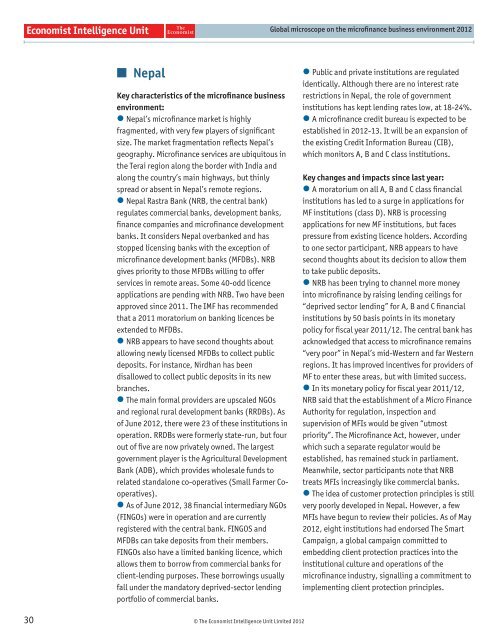
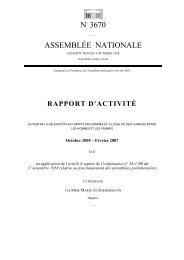
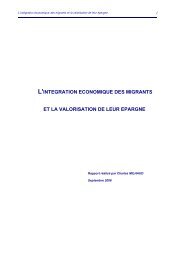
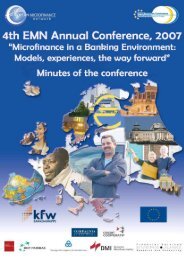
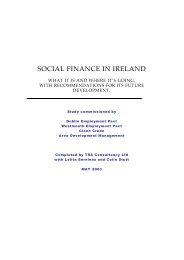

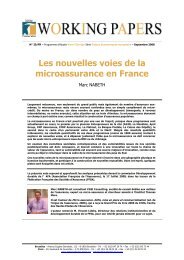
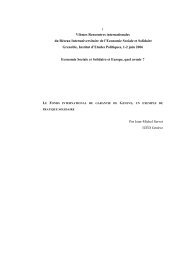
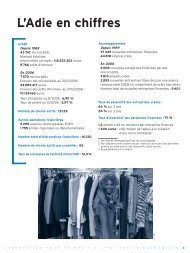
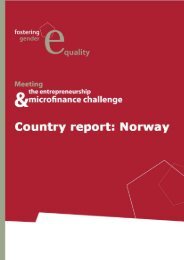
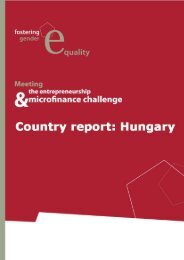
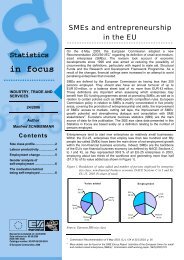
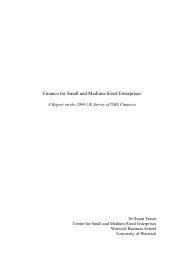
![Joint Report on Social Protection and Social Inclusion [2005]](https://img.yumpu.com/19580638/1/190x132/joint-report-on-social-protection-and-social-inclusion-2005.jpg?quality=85)
